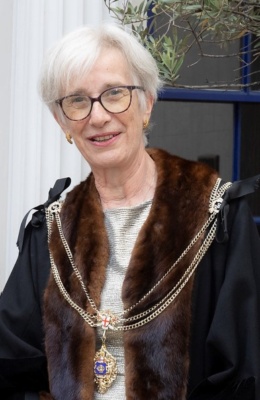Professor Jane Anderson – International’s Woman’s Day 2023
Maria Ferran, Faculty Manager & Webmaster interviews
Professor Jane Anderson for International Women’s Day 2023

MF: What did it feel like to be the second female Master of the Society?
JA: First and foremost it was an enormous honour to be elected as the 412th Master of the Society in its 404-year history. That there has only been one woman before me (Enid Taylor, Master, 2002 ) reflects the under-representation of women in senior roles within both the Livery and Medicine. It was only in 1983 with the election of Sylvia Tutt as Master, Chartered Secretaries and Administrators that a woman became Master of any livery company. Since then over 4,000 Masters have been elected, of whom about 200 have been women. Things are changing – last year there were 22 Livery Companies with women Masters, including five of the “Great Twelve”. And we have two up- and- coming women on the Court, Dr Julia Neild and Professor Fiona Wilcox.
It has been a particular pleasure to work with Briony Hudson and Christina Dale in their roles as the Presidents of the Society’s Faculties and to have the support of Heather Leake-Date, my chaplain. And no matter if it’s unusual for a woman to be Master, a majority of the staff who so effectively carry out the real, day-to-day work of the Society are women, many of whom I have been privileged to get to know much better during the year.
Although there are large numbers of women in my professional world – in 2020 47% of the 300,000-plus registered medical practitioners in the UK were women and 78% of the NHS workforce is female – women remain under-represented in senior clinical academic and key medico-political roles and the gender pay gap is all too real. These disparities have an impact on the “pipeline” of women ready and willing to take up roles within the Society.
During my year I had been actively involved with a multi-livery initiative exploring equality, diversity, and inclusion across the Livery. I had also been elected to the committee of the Lady Masters Association so intend to keep the female flag flying!
MF: Did you have in mind goals for the year? And what were they?
JA: The goal posts shifted significantly during those years and safely navigating our way through the complexities of Coronavirus and facilitating recovery had been the top priority. Looking for effective ways to support those of our members who were working on the clinical front line had become ever more important during the year.
The challenge to good health posed by urban environments was of special personal interest and also an area that the Society is keen to develop, making it an obvious theme for a year dominated by the health inequalities in London exposed by Covid 19. We have a unique opportunity to bring health in its widest meaning to the attention of City audiences and during 2022 the Society held an inaugural “Apothecary’s Lecture” with a focus on the financial aspects of pandemics. I was also especially delighted that the Society in 2022 partnered with the Medical Women’s Federation on International Women’s Day to explore the safety of women in cities. And by undertaking the Lady Mayoress’s sleep out in Guildhall Yard I was able to draw attention to the many health issues associated with street homelessness.
The interconnectedness of human and planetary health is increasingly recognised as a crucial issue of our generation. Moving towards plant-based diets is an important intervention that is within our power. Working closely with Party Ingredients we designed plant-led, gut microbiome friendly menus for Society hosted events during 2022, highlighting ways to combine delicious meals with better nutrition.
MF: What changes have you seen for women in Leadership roles?
JA: During my career the landscape has been changed by legislation and policies that value and uphold gender equity and equal opportunity. Initiatives such as the Athena SWAN Charter have made a real difference. At the same time there is a far greater recognition of the benefits of a diverse workforce, with increased emphasis on inclusion and representativeness. In today’s interdependent and interconnected world there is a shift in attitude towards a more female leadership style, with greater appreciation of inclusivity, relationship building, collaboration, and compassion. There are more women in leadership roles who can mentor and support others and there are many more male allies whose support for their female colleagues is especially valuable.
MF: Share two top tips for women looking at future roles in this area
JA: Be kind. Tracing the word kindness to its roots goes to the fundamental concept of kin, the notion that we are linked together with responsibilities to one another. It is at its most powerful when, to paraphrase Dr Julian Tudor Hart, “we understand that we humans are all of one species and that we stand or fall together, our very survival depends on helping one another, and where diversity is a strength rather than a weakness”
Be continually curious – keep asking questions and be inquisitive – you will learn new things and have more fun.
MF: What next and how can people connect with you?
JA: I look forward to taking up the much lighter responsibilities of immediate past master, and in the light of my experience to be a better-informed Court Assistant. I remain committed to the work of the Society. In my role as co-chair of London’s HIV Fast Track Cites Initiative, I hope I can further develop my interest in urban health. In 2022 I have met a great many wonderful people across the Livery and the City. We have a flourishing year group, The Platinums, and the social calendar has already taking shape.
To connect my email is janderson@duncanban.com and Twitter is @ProfJAnderson

